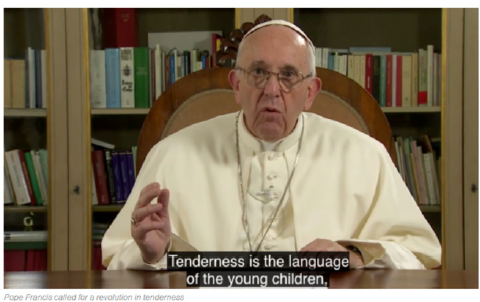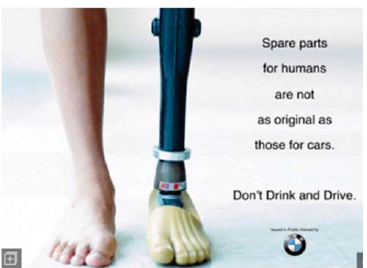Questões de Vestibular Sobre inglês
Foram encontradas 5.955 questões
Read the text below and answer question
OBESITY
Is it a disease or a lifestyle problem?
Obesity is a serious health problem in the United States and
increasingly around the world. Costs and associated
diseases continue to increase. Recent studies into the
causes of obesity indicate that the problem is more
complex, and may have less to do with “willpower” and other
such issues, than previously thought. Many obesity experts
hope this research will help physicians and others rethink
the way they understand and treat the problem. Skeptics,
however, continue to blame inactivity and overeating for
obesity. While the World Health Organization (WHO) and
others call for a reduction in sugar consumption to combat
obesity, the food industry says it is being unfairly targeted.
The planet’s population is getting fatter. Once a problem
largely confined to high-income regions, overweight and
obesity are on the rise in low- and middle-income
countries. According to the World Health Organization
(WHO), obesity has more than doubled worldwide since
1980. In 2014 more than 1.9 billion adults (39 percent of
Earth’s adult population) were overweight. That includes
600 million who were obese.
Among children, overweight and obesity are increasing
more than 30 percent faster in lower-and middle-income
countries than in developed countries. In 2013, 42 million
children under the age of 5 worldwide were overweight or
obese.
Disponível em:
http://library.cqpress.com/cqresearcher/document.php?id=cqr_ht_o
besity_2015. Acessado em 15 de outubro de 2015.
Read the text below and answer question
OBESITY
Is it a disease or a lifestyle problem?
Obesity is a serious health problem in the United States and
increasingly around the world. Costs and associated
diseases continue to increase. Recent studies into the
causes of obesity indicate that the problem is more
complex, and may have less to do with “willpower” and other
such issues, than previously thought. Many obesity experts
hope this research will help physicians and others rethink
the way they understand and treat the problem. Skeptics,
however, continue to blame inactivity and overeating for
obesity. While the World Health Organization (WHO) and
others call for a reduction in sugar consumption to combat
obesity, the food industry says it is being unfairly targeted.
The planet’s population is getting fatter. Once a problem
largely confined to high-income regions, overweight and
obesity are on the rise in low- and middle-income
countries. According to the World Health Organization
(WHO), obesity has more than doubled worldwide since
1980. In 2014 more than 1.9 billion adults (39 percent of
Earth’s adult population) were overweight. That includes
600 million who were obese.
Among children, overweight and obesity are increasing
more than 30 percent faster in lower-and middle-income
countries than in developed countries. In 2013, 42 million
children under the age of 5 worldwide were overweight or
obese.
Disponível em:
http://library.cqpress.com/cqresearcher/document.php?id=cqr_ht_o
besity_2015. Acessado em 15 de outubro de 2015.
Read the text below and answer question
Treating Alzheimer’s Disease
Are scientists close to finding a cure?
The number of Americans suffering from Alzheimer's, a degenerative brain disease, is projected to more than double by 2050, from 5.3 million today to 13.8 million. At the same time, as Baby Boomers age and medical expenses rise, the cost of treating and caring for people with the disease is expected to rise fivefold to $1.1 trillion. No treatment can yet prevent or cure Alzheimer's. However, advances in brain science and diagnostic technologies are creating breakthroughs unimagined even a few years ago. Rapidly expanding knowledge in genetics, neuroscience, biology and computing is leading to clinical trials on potential new drug therapies, research on how to prevent the disease and new tests to help diagnose it — perhaps even before symptoms appear. Scientists are debating whether the main hypothesis of what causes the disease — a buildup of amyloid protein into plaques that kill nerve cells in the brain — is correct. Patient advocates say federal Alzheimer's research is underfunded, but Congress is clearing the way for more research funds.
Disponível em: <http://library.cqpress.com/cqresearcher/static.php?page=docnotfound> Acessado em 15 de outubro de 2015.
Read the text below and answer question
Treating Alzheimer’s Disease
Are scientists close to finding a cure?
The number of Americans suffering from Alzheimer's, a degenerative brain disease, is projected to more than double by 2050, from 5.3 million today to 13.8 million. At the same time, as Baby Boomers age and medical expenses rise, the cost of treating and caring for people with the disease is expected to rise fivefold to $1.1 trillion. No treatment can yet prevent or cure Alzheimer's. However, advances in brain science and diagnostic technologies are creating breakthroughs unimagined even a few years ago. Rapidly expanding knowledge in genetics, neuroscience, biology and computing is leading to clinical trials on potential new drug therapies, research on how to prevent the disease and new tests to help diagnose it — perhaps even before symptoms appear. Scientists are debating whether the main hypothesis of what causes the disease — a buildup of amyloid protein into plaques that kill nerve cells in the brain — is correct. Patient advocates say federal Alzheimer's research is underfunded, but Congress is clearing the way for more research funds.
Disponível em: <http://library.cqpress.com/cqresearcher/static.php?page=docnotfound> Acessado em 15 de outubro de 2015.
Read the text below and answer question
Treating Alzheimer’s Disease
Are scientists close to finding a cure?
The number of Americans suffering from Alzheimer's, a degenerative brain disease, is projected to more than double by 2050, from 5.3 million today to 13.8 million. At the same time, as Baby Boomers age and medical expenses rise, the cost of treating and caring for people with the disease is expected to rise fivefold to $1.1 trillion. No treatment can yet prevent or cure Alzheimer's. However, advances in brain science and diagnostic technologies are creating breakthroughs unimagined even a few years ago. Rapidly expanding knowledge in genetics, neuroscience, biology and computing is leading to clinical trials on potential new drug therapies, research on how to prevent the disease and new tests to help diagnose it — perhaps even before symptoms appear. Scientists are debating whether the main hypothesis of what causes the disease — a buildup of amyloid protein into plaques that kill nerve cells in the brain — is correct. Patient advocates say federal Alzheimer's research is underfunded, but Congress is clearing the way for more research funds.
Disponível em: <http://library.cqpress.com/cqresearcher/static.php?page=docnotfound> Acessado em 15 de outubro de 2015.
By 2050
WHETHER YOU’RE TWEETING, SHOPPING OR JUST BROWSING, INTERNET COMPANIES ARE MONITORING YOU.
Nobody likes being spied on. When you’re innocently browsing the web, it’s deeply unpleasant to think that faceless technology corporations are monitoring and recording your every move. While such data collection is legal, that doesn’t mean it’s all right. There are plenty of things you might prefer to keep to yourself, such as your income, your sexuality, your political views or your membership of the Yoko Ono fanclub.
While you might console yourself with the knowledge that all of this information is mostly used for targeting ads, that might not be the case for much longer. The internet giants are building up ever more detailed user profiles – and finding new ways to exploit that information.
Even if you’ve nothing to hide, therefore, it may be wise to minimise your exposure to online tracking. Here’s how Google spy on you – and how to protect your privacy.
Most of us use Google services every day, and as a result the web giant knows a huge amount about our movements and interests. You can find out everything it’s learned about you at myaccount.google.com. Your data is all set out in an impressively forthright way; the only problem is, there’s so much information to work through that it can be bewildering to navigate.
One section that’s worth your attention is “Manage your Google activity”. Here you’ll find Google’s activity controls, which let you disable various types of data collection.
For example, you can tell Google not to log your Chrome browsing history and activity, to stop tracking your location and to desist from keeping records of any voice commands you might issue. Turning these features off can make Google services less smart, but you might consider that a price worth paying. For a closer look at the information Google’s been collecting on you lately, click on “My activity”. This brings up a timeline showing all of your searches, webpage visits, Android app activity and so forth. Seeing your digital life laid bare like this can be pretty unnerving: if there’s something you’d prefer Google to forget, simply click on the menu icon to its right and delete.
If you want to thoroughly inspect everything Google knows about you, you can even download a comprehensive archive of personal information by clicking on “Control your content” > “Download your data”. Be warned, though, this archive can be huge: the default settings include all the emails in your Gmail account, and any videos you may have uploaded to YouTube.
If you want to limit the information you share with Google in the future, the easiest way is simply to use it less. For example, try the privacy-focused search engine at duckduckgo.com, and use an alternative browser such as Firefox.
Fonte: https://www.theguardian.com/technology/2017/may/13/ how-to-get-privacy-digital-life-data-monitoring-gathering-amazon-facebook-google (editado). Acesso em: 10 de novembro de 2017.
Segundo o texto, as informações que o usuário gera ao navegar pela internet podem servir para fins outros que não apenas publicitários. A empresa Google, por exemplo, oferece recursos que permitem ao usuário evitar a espionagem excessiva. Abaixo, marque a alternativa em que constam as orientações sobre como evitar o recolhimento de informações pelo Google, de acordo com o texto:
POPE FRANCIS DELIVERS SURPRISE SPEECH TO TED CONFERENCE

“No one is an island,” the Pope has said during a surprise talk at the TED2017 conference in Vancouver, British Columbia.
Appearing during a 17-minute pre-recorded talk, the Francis became the first Pope in history to participate in a TED (Technology, Entertainment, Design) conference.
Speaking from behind a desk in the Vatican, Pope Francis said: “First and foremost, I would love it if this meeting could help to remind us that we all need each other, none of us is an autonomous and independent ‘I,’ separated from the other, and we can only build the future by standing together, including everyone.”
TED is an organisation, which hosts conferences all over the world where many high profile figures talk on a number of topics.
During his speech, Pope Francis said that he hoped social inclusion and equality would accompany scientific and technological innovation.
He said: “How wonderful would it be if solidarity, this beautiful and, at times, inconvenient word, were not simply reduced to social work, and became, instead, the default attitude in political, economic and scientific choices, as well as in the relationships among individuals, peoples and countries,” he said.
“Only by educating people to a true solidarity will we be able to overcome the ‘culture of waste,’ which doesn’t concern only food and goods but, first and foremost, the people who are cast aside by our technoeconomic systems which, without even realising it, are now putting products at their core, instead of people.”
The Pope went on to call for a “revolution of tenderness,” asking: “And what is tenderness? It is the love that comes close and becomes real. It is a movement that starts from our heart and reaches the eyes, the ears and the hands.”
Pope Francis reminded his audience that we all depend on each other, saying: “The future of humankind isn’t exclusively in the hands of politicians, of great leaders, of big companies,” he said. “Yes, they do hold an enormous responsibility. But the future is, most of all, in the hands of those people who recognise the other as a ‘you’ and themselves as part of an ‘us.’ We all need each other.”
The Pope also said that good intentions were not enough. He said: “Good intentions and conventional formulas, so often used to appease our conscience, are not enough. Let us help each other, all together, to remember that the other is not a statistic or a number. The other has a face. The ‘you’ is always a real presence, a person to take care of.”
Fonte: http://www.catholicherald.co.uk/news/2017/04/26/pope-francis-delivers-surprise-speech-to-ted-conference/ (editado). Acesso em: 09 de novembro de 2017.
NO MAN IS AN ISLAND
No man is an island, Entire of itself;
Every man is a piece of the continent,
A part of the main.
If a clod be washed away by the sea,
Europe is the less,
As well as if a promontory were:
As well as if a manor of thy friend’s
Or of thine own were.
Any man’s death diminishes me,
Because I am involved in mankind.
And therefore never send to know for whom the bell tolls;
It tolls for thee.
By John Donne (Meditation XVII)
John Donne (1572-1631), poeta inglês, foi um dos nomes mais expressivos de sua época. Ele era cristão, foi pastor anglicano e chegou a ser nomeado decano da St. Paul Cathedral, em Londres. Sua obra é marcada por poemas de tom metafísico, entre outros. Na fala do Papa Francisco à conferência TED, é possível estabelecer uma relação intertextual com o poema “No man is an island”, de John Donne. Na fala do Papa, a relação intertextual é estabelecida pelo uso da expressão metafórica “No one is an island.” Entre as alternativas abaixo, indique o trecho do discurso do Papa Francisco cujo sentido mais se aproxima à mensagem do poema de John Donne:

Na tirinha ao lado:


Fonte: http://constitutionus.com/ Acesso em: 10 de novembro de 2017.
Nesse sentido, a mensagem verbo-visual dos referidos cartazes busca:
Leia o texto publicitário abaixo e responda:

Esta campanha publicitária busca conscientizar as
pessoas acerca do perigo da associação entre bebida
alcoólica e condução de veículos automotores. Que
mensagem a campanha constrói para convencer as
pessoas em relação ao perigo dessa associação?
War Pigs
Generals gathered in their masses Just like witches at black masses Evil minds that plot destruction Sorcerers of death’s construction In the fields the bodies burning As the war machine keeps turning Death and hatred to mankind Poisoning their brainwashed minds Oh, Lord, yeah!
Politicians hide themselves away They only started the war Why should they go out to fight? They leave that role to the poor, yeah!
Time will tell on their power minds Making war just for fun Treating people just like pawns in chess Wait ‘till their judgement day comes, yeah!
Now in darkness, world stops turning Ashes where their bodies burning No more war pigs of the power Hand of God has stuck the hour Day of judgement, God is calling On their knees, the war pigs crawling Begging mercy for their sins Satan, laughing, spreads his wings Oh, Lord, yeah!
War Pigs, do grupo britânico de rock heavy metal Black Sabbath, critica as guerras, que causam morte e destruição. Com base na letra acima, responda quem são os “war pigs” referidos na música?
Leia o trecho do texto jornalístico abaixo e responda:
Drone Surveillance

New rules from the U.S. Federal Aviation Administration (FAA) for the commercial use of unmanned aircraft lighter than 55 pounds have opened the door to what could be a massive industry. It’s much bigger than delivery drones, which are not yet practical or legal in the U.S. First we’ll see more drones doing things like surveying real estate and inspecting infrastructure such as roofs, high bridges, cell towers, power lines, and wind turbines.
But our new drone reality has privacy advocates spooked: low-cost vehicles and sensors are likely to spur widespread adoption of a technology that can be used for persistent aerial surveillance, and bad actors could exploit gaps in existing privacy laws. It’s also not clear which government entities, if any, are responsible for addressing drone-related privacy concerns. The FAA has declined to make rules. The Federal Trade Commission, the U.S. government’s primary consumer privacy cop, is still exploring the issue. A few state laws have emerged to fill the void, but the overall landscape is inconsistent and unclear.
Drone industry advocates argue that these aircraft are not all that different from other technologies that could be used to conduct surveillance, and that state voyeurism and nuisance laws already in place will protect consumers.
Adaptado de: www.technologyreview.com Acesso em: 13 nov. 2016
A indústria de veículos aéreos não tripulados tem
crescido e aprimorado-se nos Estados Unidos. Em
função disso, o texto levanta a seguinte questão:
A partir da leitura da tirinha abaixo, pode-se inferir que:


The word “myriad” (line 10) means a large number of something.

The adjectives “middle-aged” (line 7), “delightful” (line 9), “self-tormenting” (line 11) and “wry” (line 15) are describing only the character Bento Santiago.

“this novel” (lines 5-6) refers to the “Library of Latin America”.

“1900” (line 5) is the year when Dom Casmurro was launched in English by Oxford.

The verbs “begins” (line 3), “is” (line 6) and “fails” (line 10) are all in the simple present tense.

it is possible to know so many details about the character Capitu because of the rich descriptions the text gives about her.

the collection “Library of Latin America” is on the market for so many years.